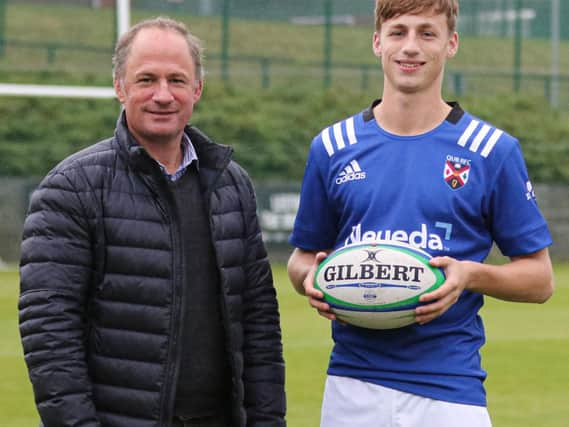Ulster legend David Humphreys' son following in dad’s footsteps


David Humphreys is a legend of Queen’s, Ulster and Ireland rugby and now son James has joined the student club.
David famously scored Ulster’s most iconic try of the professional era against Stade Francais in the 1999 European cup semi-final and kicked a last-gasp drop goal at the Ospreys to win the 2006 Celtic League title - Ulster’s last bit of silverware.
Advertisement
Hide AdAdvertisement
Hide AdHe is also the province’s record points scorer with 1585 in his decade as a player at Ravenhill.
Add in 72 Ireland caps and 560 points, which puts Humphreys third on his country’s all time points scorers list.
But for James, who has joined Queen’s from the Gloucester academy and will study geography at Queen’s, David is just dad.
“I think it’s like anyone would tell you, it’s not like having David Humphreys as a dad, he’s my dad, I look up to him in the same way most people look up to their dads,” said James.
Advertisement
Hide AdAdvertisement
Hide Ad“He’s always been there for me, I think for anyone to play for the same team that their dad did, it’s something that’s pretty cool but that’s not what it’s been about for me.
“I just want to have as much fun as I can playing rugby for Queen’s while I’m getting a good education out of it.”
James was a scrum-half at school but has switched to David’s old position of out-half. He just happy to arrive back in Northern Ireland and get playing rugby, kicking a penalty on his competitive debut in a 23-14 win over Banbridge.
“It’s bizarre with everything going on but I’m settling in really well, there’s a great bunch of guys here and they’ve made it really easy for me,” he said.
Advertisement
Hide AdAdvertisement
Hide Ad“A few weeks ago, to start all we could do was socially distanced, pre-season running so it’s a strange way to meet people.
“I’ve known everyone for about six weeks but everyone is so welcoming you almost feel as if you don’t need an introduction, you’re taken in straight away.
“I played for the 2s against Malone three weeks and then I got 20 minutes at the end against Harlequins so that was good.”
David (pictured below) is happy to see his son at the club where his senior career started.
Advertisement
Hide AdAdvertisement
Hide Ad“We’re very proud to see him play and enjoy it, he chose to come back here, he sees this as his home, as you’d hope with any university career,” he said.
“It’s very welcoming, the coaching is great but more importantly, he’s settled in. It’s about throwing yourself in and immersing yourself into university sport and university life.
“All I can hope is that when James got to my stage, he’ll look back on it with the same wonderful memories and friendships that I do, if he does that, it’s been a success.”
David has fond memories of playing his rugby for Queen’s after leaving Ballymena Academy and it gave him a good schooling for the professional game.
Advertisement
Hide AdAdvertisement
Hide Ad“It was a release to come to Queen’s and play rugby. When I was here, 1990, it was a part of the university experience - yes you were working hard to get your degree to ultimately get a job - but coming to play rugby was the way you made friendships, that was the fun part.
“Your group of friends, your social life, was built around the group of guys that you were playing with and training with, it was an incredible time, it’s incomparable to what it is now,” he added.
“A lot of guys now will have one eye on a professional career, the quality of coaching is so good, the facilities are so good; the university supports aspiring athletes to get to a top international level.
“That’s how things have evolved, everything is so different and it brings back fantastic memories of times in the Dub.”
Advertisement
Hide AdAdvertisement
Hide AdDavid believes the club game still has a vital role to play in the professional era.
“Sometimes you forget why you play because you’re going for the next result and once you get it, you’re planning for the next one,” he said.
“We all started to play because we loved it, even after university, when you were working all day, you couldn’t wait to get to training because that was what you wanted.
“Professional rugby needs the club game, it needs players who have been playing for a long time teaching those young players who may become professional players.”
Advertisement
Hide AdAdvertisement
Hide Ad---------------------------------------------------------------------------------
A message from the Editor:
Thank you for reading this story on our website. While I have your attention, I also have an important request to make of you.
With the coronavirus lockdown having a major impact on many of our advertisers - and consequently the revenue we receive - we are more reliant than ever on you taking out a digital subscription.
Subscribe to newsletter.co.uk and enjoy unlimited access to the best Northern Irish and UK news and information online and on our app. With a digital subscription, you can read more than five articles, see fewer ads, enjoy faster load times, and get access to exclusive newsletters and content. Visit https://www.newsletter.co.uk/subscriptions now to sign up.
Advertisement
Hide AdAdvertisement
Hide AdOur journalism costs money and we rely on advertising, print and digital revenues to help to support them. By supporting us, we are able to support you in providing trusted, fact-checked content for this website.
Thank you,
Alistair Bushe
Editor
Comment Guidelines
National World encourages reader discussion on our stories. User feedback, insights and back-and-forth exchanges add a rich layer of context to reporting. Please review our Community Guidelines before commenting.